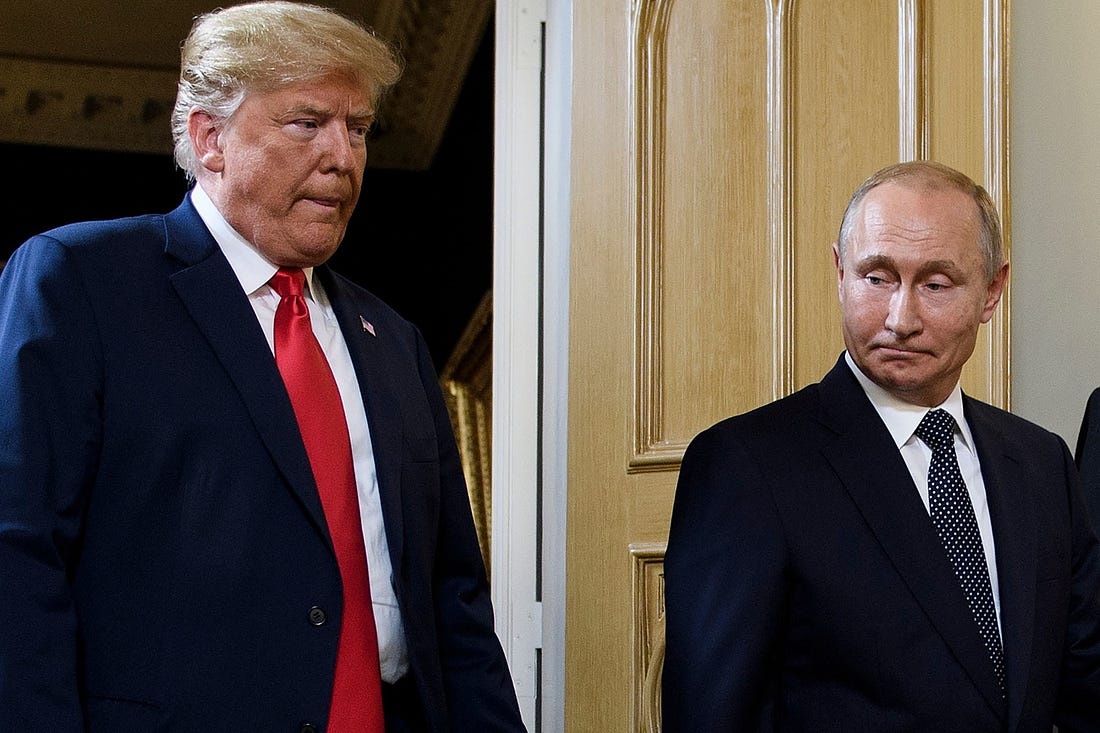Trump's Burden of Proof
If the president can't explain his bromance with Putin, it's fair to conclude the worst.

Key figures in American national security have been escalating threats posed by Russian operatives ever since Donald Trump "threw his country under the bus.”
Director of National Intelligence Dan Coats has "gone rogue," according to White House aides, in saying that we are under siege right now. As I reported recently, he even went so far as to compare the 2016 election to the attacks of Sept. 11, 2001.
Joining Coats is Deputy Attorney General Rod Rosenstein who announced yesterday a new policy, according to the Washington Post, "designed to help counter hacking and disinformation campaigns, such as the one Russia undertook in 2016."
The Department of Justice will alert US firms, private groups and individuals “covertly attacked by foreign actors.” The Obama administration did not go this far. Where the former president was (understandably, I think) ambivalent, Rosenstein isn't.
So you see what's happening.
Even as the president gets closer to Russia, the national security establishment is trying to get farther away. There is literally a widening gap within the government, one in which partisans pulled into the gravitational orbit of a gassy Jupiter-like planet take the side of the Kremlin while patriots take the side of the United States.
This should be an opportunity for the Democrats. To my knowledge, there has never been an satisfactory explanation for why the president met with Putin in Helsinki, and why they plan to meet in the fall. By this, I mean that the White House has not given even the appearance of a rationale, something like Barack Obama's "Russian reset." The absence of even the appearance of a rationale leaves many of us to wonder why, and it gives the Democrats a chance to provide explanations of their own.
But more importantly is that the burden of proof is shifting. "Burden of proof" is a term referring to those who bear responsibility for proving an accusation beyond doubt. In a court of law, the burden is on the accuser, not the accused. Even if defendants are guilty, it doesn't matter if the prosecution can't prove its case.
In terms of national security, the accusers have made their case. We know from this week's explosive story from the New York Times that the president was shown incontrovertible evidence of the Kremlin’s sabotaging of Hillary Clinton's campaign.
We know the president has known the truth for months. We know that every time he said he wasn't sure if the Russians attacked, if maybe a 400-pound man in his bed in New Jersey was the culprit, that he was lying, and that he continued to lie to us.
And now we have the national security establishment escalating threat levels, even enshrining them in a new policy that takes Russian hacking more seriously than even the Obama administration did. Given all this, who bears the burden of proof?
The president. Donald Trump must explain why, despite everything we know to be true, he continues to lie about the Kremlin's ongoing information warfare, and why he insists on bringing the head of a foreign government that is engaged right now in information warfare against the United States into the heart of American power.
If he cannot, and I don't think he can, it is entirely fair to surmise that at the very least, Donald Trump won't defend America, at the very most, that he's in league with Putin, even hoping that sabotage will aid Congressional Republicans in the midterms.
Either is an abomination.
Both are treasonous.
Important news
As you know, the Editorial Board believes that politics is simpler and more complex than most people realize. That’s why the newsletter is published every day, right on top of the news cycle, to bring you up to speed and (I hope) much-needed clarity. This is a lot of work, work that has some value. Please take a moment to think about this:
How much does the Editorial Board mean to you? How much would you pay?
Reply to this message to let me know. Your feedback is important.
Thanks, JS


